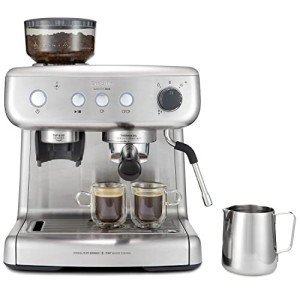Best Espresso Machines: A Comprehensive Guide
Espresso machines have actually become a staple in coffee culture, attracting enthusiasts and casual drinkers alike. The best shot of espresso can elevate the coffee experience, and picking the ideal machine is important for accomplishing this objective. This article looks into the world of espresso machines, exploring a few of the very best choices offered on the marketplace today. Espresso Machines Under £100 will cover the kinds of machines, essential functions to think about, a comparison table, and frequently asked questions.
Types of Espresso Machines
Before venturing into specific items, it's vital to understand the numerous types of espresso machines readily available:
- Manual Machines: Also called lever machines, these require the user to by hand manage the pressure and flow of water. They provide a hands-on experience but need more skill.
- Semi-Automatic Machines: These machines automate the pressure and temperature level, while permitting users to manage the shot timing. They are ideal for those who wish to take control without needing excessive effort.
- Automatic Machines: These devices automate the developing process completely; users just pick the size and strength of the shot. Great for novices.
- Super-Automatic Machines: This type grinds the beans, tamps, brews, and even froths milk instantly. They're outstanding for convenience, making them ideal for those who want speed without compromising quality.
- Pill Machines: Utilizing pre-packaged coffee pods, these are the most basic machines for making espresso. While hassle-free, they often lack the depth of flavor discovered in newly ground beans.
Secret Features to Consider
When browsing for the best espresso machine, numerous crucial features should direct your decision:
- Pressure: The ideal pressure for an espresso machine is 9 bars. This pressure is essential for drawing out tastes successfully.
- Temperature level Control: Consistent water temperature level is vital for a great espresso. Try to find machines with PID (Proportional Integral Derivative) temperature control.
- Build Quality: Machines made from high-quality materials tend to last longer and supply a much better experience.
- Size and Footprint: Consider your offered counter area. Some machines are compact, while others need substantial space.
- Grinder Quality: A built-in grinder provides convenience, however the quality of the grinder impacts the final taste. Doser or doserless types alter the flavor profile considerably.
- Reduce of Use and Cleaning: Consider how easy the machine is to clean and preserve. Espresso Machines With Milk Frother with removable parts generally offer easier cleansing.
Contrast Table of Best Espresso Machines
Here's a comparison table showcasing some of the most suggested espresso machines based upon numerous user reviews and expert ratings:
| Espresso Machine | Type | Pressure (Bars) | PID Control | Grinder Type | Cost Range |
|---|---|---|---|---|---|
| Breville Barista Express | Semi-Automatic | 9 | Yes | Cone-shaped burr grinder | ₤ 600 - ₤ 700 |
| De'Longhi EC155 | Manual | 15 | No | No grinder | ₤ 100 - ₤ 150 |
| Rancilio Silvia | Semi-Automatic | 9 | No | No grinder | ₤ 700 - ₤ 800 |
| Saeco Xelsis | Super-Automatic | 15 | Yes | Integrated grinder | ₤ 1,000 - ₤ 1,500 |
| Nespresso VertuoPlus | Pill | N/A | No | No grinder | ₤ 150 - ₤ 200 |
| Gaggia Classic Pro | Semi-Automatic | 9 | Yes | No grinder | ₤ 400 - ₤ 500 |
Summary of Best Espresso Machines
- For Beginners: The De'Longhi EC155 is an excellent beginning point due to its affordable price and ease of use.
- For Serious Enthusiasts: The Rancilio Silvia offers a balance in between quality and control, interesting those who want to refine their barista abilities.
- For Convenience: The Saeco Xelsis sticks out as a top super-automatic alternative, best for users seeking optimum ease without compromising taste.
Frequently Asked Questions (FAQs)
Q1: What is the very best pressure for extracting espresso?A1: The ideal pressure is 9 bars; this pressure level is optimum for extracting the tastes in espresso.
Q2: How frequently should I clean my espresso machine?A2: Regular cleaning is necessary. For machines with integrated grinders, it is best to clean them after every use. Deep cleaning must be done weekly or monthly depending upon use and model.
Q3: Can I use routine coffee in an espresso machine?A3: Espresso is made from carefully ground coffee, preferably roasted particularly for espresso. While you can use routine coffee, the taste and extraction might vary.
Q4: How long can my espresso machine last?A4: With proper care and upkeep, a high-quality espresso machine can last several years, even years.
Q5: What grinder should I use for espresso?A5: A burr grinder is preferable, as it offers constant grind size which is crucial for correct extraction.
The journey to discovering the very best espresso machine can be an exciting one, filled with discovery and capacity for developing one's coffee palate. Whether going with the simpleness of a capsule machine or the control of a manual design, understanding the various types and features can significantly boost the experience. With advances in technology and development, there's a suitable espresso machine for all preferences and ability levels on the marketplace today. Investing in the right machine not only assures excellent taste however likewise raises the general coffee experience.

